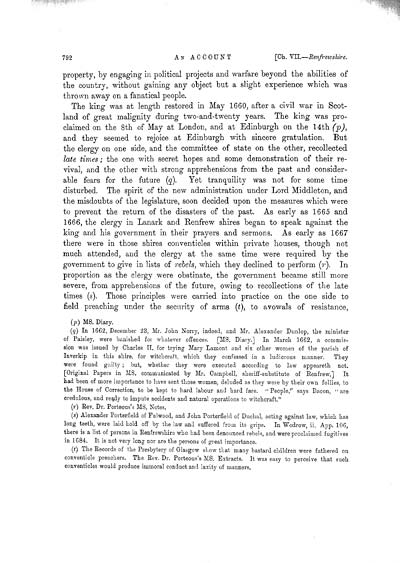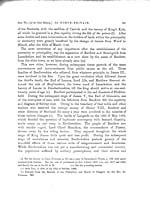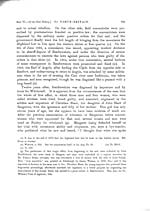Volume 6
(352) Page 792
Download files
Individual page:
Thumbnail gallery: Grid view | List view

792 property, by engaging in political projects and warfare beyond the abilities of the country, without gaining any object but a slight experience which was thrown away on a fanatical people. The king was at length restored in May 1660, after a civil war in Scot- land of great malignity during two-and-twenty years. The king was pro- claimed on the 8th of May at London, and at Edinburgh on the 14th (p), and they seemed to rejoice at Edinburgh with sincere gratulation. But the clergy on one side, and the committee of state on the other, recollected late times; the one with secret hopes and some demonstration of their re- vival, and the other with strong apprehensions from the past and consider- able fears for the future (q). Yet tranquility was not for some time disturbed. The spirit of the new administration under Lord Middleton, and the misdoubts of the legislature, soon decided upon the measures which were to prevent the return of the disasters of the past. As early as 1665 and 1666, the clergy in Lanark and Renfrew shires began to speak against the king and his government in their prayers and sermons. As early as 1667 there were in those shires conventicles within private houses, though not much attended, and the clergy at the same time were required by the government to give in lists of rebels, which they declined to perform (r). In proportion as the clergy were obstinate, the government became still more severe, from apprehensions of the future, owing to recollections of the late times (s). Those principles were carried into practice on the one side to field preaching under the security of arms (t), to avowals of resistance, (p) MS. Diary. (q) In 1662, December 23, Mr. John Norry, indeed, and Mr. Alexander Dunlop, the minister of Paisley, were banished for whatever offences. [MS. Diary.] In March 1662, a commis- sion was issued by Charles II. for trying Mary Lamont and six other women of the parish of Inverkip in this shire, for witchcraft, which they confessed in a ludicrous manner. They were found guilty ; but, whether they were executed according to law appeareth not. [Original Papers in MS. communicated by Mr. Campbell, sheriff-substitute of Renfrew,] It had been of more importance to have sent those women, deluded as they were by their own follies, to the House of Correction, to be kept to hard labour and hard fare. " People,'' says Bacon, '' are credulous, and ready to impute accidents and natural operations to witchcraft." (r) Rev. Dr. Porteous's MS. Notes. (s) Alexander Porterfield of Fulwood, and John Porterfield of Duchal, acting against law, which has long teeth, were laid hold off by the law and suffered from its gripe. In "Wodrow, ii. App. 106, there is a list of persons in Renfrewshire who had been denounced rebels, and were proclaimed fugitives in 1684. It is not very long nor are the persons of great importance. (t) The Records of the Presbytery of Glasgow show that many bastard children were fathered on conventicle preachers. The Rev. Dr. Porteous's MS. Extracts. It was easy to perceive that such conventicles would produce immoral conduct and laxity of manners.
Set display mode to:
![]() Universal Viewer |
Universal Viewer | ![]() Mirador |
Large image | Transcription
Mirador |
Large image | Transcription
Images and transcriptions on this page, including medium image downloads, may be used under the Creative Commons Attribution 4.0 International Licence unless otherwise stated. ![]()
| Caledonia, or, An account, historical and topographic of North Britain from the most ancient to the present times > Volume 6 > (352) Page 792 |
|---|
| Permanent URL | https://digital.nls.uk/74531734 |
|---|---|
| Description | Vol. VI. |
|---|---|
| Attribution and copyright: |
|

